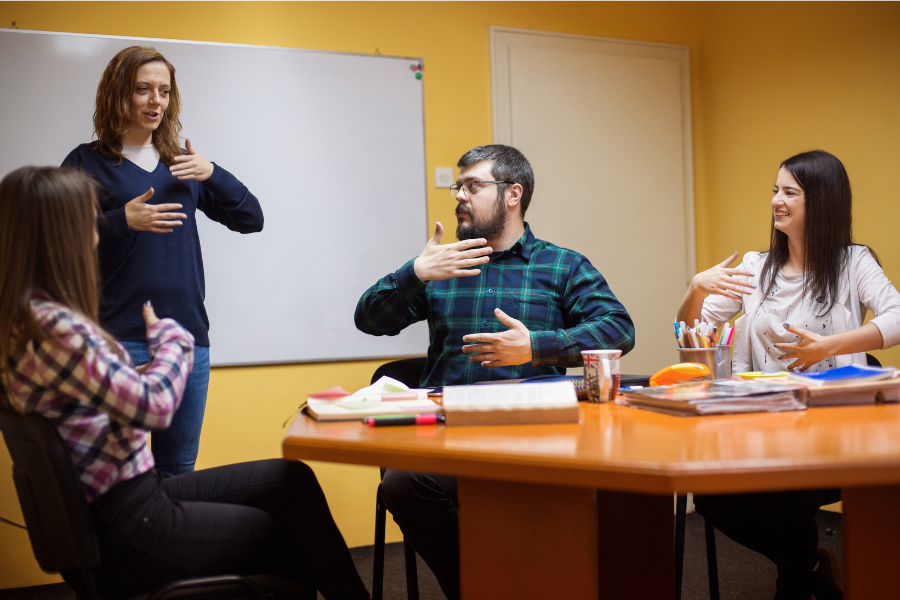10 Awesome Things You Can Do to Be an Ally for the Deaf Community (Part 2)
Table of Contents
Introduction
Welcome to Part Two of “10 Awesome Things You Can Do To Be An Ally For The Deaf Community.” This blog continues our discussion of the practical things you can do to become an ally for the Deaf community. Click here to read Part 1.
Ally defined: To be an ally means to commit oneself to support, advocate for, and stand in solidarity with a group or individual, often from a marginalized or an underrepresented community.
Supporting the Deaf community as an ally involves a profound dedication to grasping and actively enhancing Deaf culture, ASL (American Sign Language), and the specific needs of Deaf individuals in our society. Part 2 continues our quest to show you how to foster empowerment and inclusivity within the Deaf community and the impact of those actions so you too can be an ally for the Deaf Community.
Number 6: Amplify Deaf Experiences, Insights, and Opinions
Amplifying Deaf experiences, insights, and opinions, means the Deaf perspective is brought to light. This amplification means that Deaf people have the right to tell their own story. This is empowering. When we empower Deaf individuals to share their perspectives with a broader audience it fosters greater understanding and appreciation of the Deaf community’s diversity. This is a critical component to be an effective ally for the Deaf community.
When you amplify Deaf experiences, insights and opinions you will be more prepared to:
Increase Deaf Visibility and Awareness
When an ally actively amplifies Deaf experiences, insights, and opinions, they help increase the visibility of the Deaf community in mainstream media and public discourse. This is crucial because greater visibility can lead to broader awareness of the unique challenges and injustices that Deaf individuals face. By bringing these issues to the forefront, an ally can help ensure that Deaf people are not overlooked in conversations about diversity, rights, and accessibility.
Promote Understanding and Empathy
When the amplification of Deaf people occurs through their sharing of experiences, insights, and opinions, there is a cultivation of understanding and empathy amongst the mainstream culture. Stereotypes and misconceptions about Deafness and Deaf culture are broken down through the showcasing of the rich, diverse realities of what it means to live as a Deaf person. This empathy is essential for building supportive and inclusive communities where Deaf individuals feel truly valued and understood.
Strengthen Advocacy Efforts
Amplifying Deaf experiences, insights, and opinions ensures that the specific needs and concerns of Deaf individuals are accurately represented in advocacy efforts. An ally can use their platforms to push for policies and practices that directly benefit the Deaf community, such as improved accessibility services and anti-discrimination laws. By amplifying Deaf perspectives in these spheres, an ally helps forge a more powerful and impactful call for change that truly reflects the community’s authentic experiences and aspirations.
Validate Deaf Experiences
Providing a platform for Deaf experiences validates and affirms the experiences of Deaf individuals. It sends a powerful message that these experiences are valid and important, deserving of public attention and respect. This validation can be incredibly empowering for the Deaf community, as it acknowledges their struggles and triumphs alike.
Encourage Cultural Exchange
Amplifying Deaf perspectives encourages cultural exchange and enriches society as a whole. It allows hearing individuals to learn about Deaf culture, history, and ASL, fostering a greater appreciation and respect for this vibrant community. Such cultural exchanges can dismantle prejudices and build bridges between the Deaf and hearing communities, promoting unity and cooperation.
Facilitate Inclusive Dialogue
When Deaf perspectives are amplified, it facilitates a more inclusive dialogue about societal issues. It ensures that Deaf individuals are not just subjects being discussed but are active participants in the conversations that affect them. This inclusivity is key to developing solutions that are truly effective and equitable, reflecting the diverse needs of all community members.
Amplifying Deaf experiences, insights, and opinions is vital for fostering understanding, empathy, and visibility within the broader community. By giving Deaf individuals the platform to share their stories and perspectives, an ally can break down stereotypes and advocate for necessary changes in policies and attitudes. This empowers the Deaf community and enriches our society with diverse cultural exchanges and more inclusive dialogues, making it a crucial step towards becoming an ally for the Deaf community.
Number 7: Support Deaf-Led Initiatives and Businesses
Supporting Deaf-led initiatives and businesses is a critical aspect of being an effective ally for the Deaf community. This support fosters economic empowerment and also sends a strong message about the value and importance of Deaf culture and leadership within the broader societal framework.
When you support Deaf-led initiatives and businesses you will be more prepared to:
Provide Economic Empowerment
Supporting Deaf-led businesses and initiatives directly contributes to the economic independence and sustainability of the Deaf community. By patronizing these businesses, an ally helps create and maintain jobs for Deaf individuals, promoting financial independence and stability. Economic empowerment is a fundamental step towards equality as it enhances the community’s ability to advocate for themselves and invest in their own cultural and educational projects.
Strengthen Visibility and Representation
When an ally supports Deaf-led enterprises, they help increase and strengthen the visibility of these businesses in the mainstream market. This heightened visibility is crucial for challenging prevailing stereotypes about the capabilities of Deaf individuals. It also provides tangible examples of Deaf excellence and leadership, which can inspire other members of the Deaf community and educate the broader public about the diversity and potential within this community.
Promote Cultural Preservation and Promotion
Deaf-led initiatives often focus on promoting Deaf culture, language, and history. By supporting these efforts, an ally contributes to the preservation and dissemination of this rich cultural heritage. This is vital for ensuring that Deaf culture is celebrated and can continue to thrive, both within the Deaf community and in the wider world.
Strengthen Community Bonds
Investing in Deaf-led businesses and initiatives strengthens the overall foundation of the Deaf community. It creates networks of support where Deaf entrepreneurs/leaders can collaborate. This support advances each other’s growth and success. These strengthened community bonds enhance the resilience of the community and enable it to more effectively advocate for its needs and rights.
Encourage Inclusivity in the Marketplace
Support from an ally encourages more inclusive business practices in the wider market. It signals to other businesses the importance of considering Deaf customers and clients in their operations. This has the potential of leading to more widespread adoption of Deaf-friendly practices such as using ASL and making business materials accessible in various formats.
Supporting Deaf-led initiatives and businesses encourages inclusivity and diversity in the wider economic landscape. By championing Deaf-led enterprises, an ally promotes financial independence and cultural preservation within the Deaf community. This support is instrumental in breaking down stereotypes, fostering community resilience, and ensuring that Deaf culture continues to enrich our society.
Number 8: Support Deaf Education
Supporting Deaf education is a fundamental way to become a better ally for the Deaf community. This support can manifest in various forms, such as advocating for Deaf residential schools, promoting the use of ASL in wider educational settings, or supporting policies that elevate educational outcomes for Deaf students.
When you support Deaf education you will be more prepared to:
Empower the Deaf Community
Education is a powerful tool for empowerment. By supporting Deaf education, an ally helps equip Deaf individuals with the knowledge and skills needed to navigate a predominantly hearing world more effectively. This empowerment fosters independence and self-reliance within the Deaf community, enabling them to advocate for themselves and their peers more effectively.
Enhance Educational Opportunities
Supporting Deaf education helps to ensure that Deaf children and adults have access to quality education in an environment that respects and promotes their language and culture. This includes backing educational models that incorporate ASL and Deaf culture into the curriculum, which can significantly improve learning outcomes for Deaf students by teaching them in their natural language.
Support Academic and Social Success
A strong foundation in Deaf education correlates with better academic and social outcomes for Deaf individuals. When Deaf students are educated in a supportive, culturally affirming environment, they are more likely to succeed academically and socially. This success translates into better job opportunities and greater contributions to society as a whole.
Build Inclusive Communities
Supporting Deaf education helps build more inclusive communities. Schools that embrace Deaf culture and ASL as central components of their educational model tend to be more inclusive and welcoming to all types of diversity. This inclusivity enriches the educational experience for everyone involved by promoting a wider understanding and acceptance of different cultures and ways of communicating.
Promote Language Equality
Advocating for ASL in educational contexts emphasizes the importance of language equality. ASL is a fully-developed, natural language that serves as the primary mode of communication for many in the Deaf community. Supporting ASL education not only validates its legitimacy as a language but also helps to preserve it as a critical component of Deaf culture.
Bridge Communication Gaps
When an ally pushes for the inclusion of ASL and Deaf culture in educational programs, it also benefits hearing individuals. Learning ASL and about Deaf culture can bridge communication gaps between the Deaf and hearing worlds, fostering better understanding and reducing prejudices. It prepares hearing individuals to interact more effectively and respectfully with Deaf individuals.
Influence Policy Changes
An ally who support Deaf education can influence educational policies to be more inclusive of Deaf needs. This might involve advocating for the recruitment of Deaf teachers, the implementation of Deaf studies programs, or the integration of technology designed to assist Deaf learners. Such policy changes can have a long-lasting impact on the educational landscape for the Deaf community.
By advocating for comprehensive educational policies and inclusive learning environments that honor ASL and Deaf culture, an ally contributes significantly to bridging communication gaps, promoting language equality, and empowering Deaf individuals. This commitment not only supports the academic and social success of Deaf students but also enriches our broader community by fostering understanding and inclusivity across cultural boundaries.
Number 9: Collaborate with Deaf professionals
Collaborating with Deaf professionals is an essential practice for one looking to be an ally for the Deaf community. This type of collaboration not only fosters mutual understanding and respect but also brings numerous benefits both to the ally and to the Deaf community.
When you collaborate with Deaf professionals you will be more prepared to:
Break Down Stereotypes
Working closely with Deaf professionals helps dispel common misconceptions and stereotypes about the abilities of Deaf individuals. An ally who recognizes and values the contributions of their Deaf colleagues challenges unfounded biases and promotes a more informed understanding among their peers.
Promote Professional Equality
Collaborating with Deaf professionals challenges and helps dismantle the systemic barriers that often prevent Deaf individuals from obtaining and excelling in professional roles. By working alongside Deaf colleagues, an ally helps promote an environment of professional equality where talents and skills are recognized regardless of ability to hear.
Encourage Deaf Leadership
By supporting and acknowledging the expertise of Deaf professionals, an ally helps elevate these individuals into leadership roles where they can effect change. Deaf leaders bring essential perspectives and solutions to issues affecting their community thus driving forward movements for greater accessibility and inclusion.
Increase Cultural Competence
Engaging with Deaf professionals allows an ally to gain firsthand insight into Deaf culture and communication styles. This direct interaction enriches an ally’s understanding and appreciation of the nuances of Deaf culture, which is crucial for fostering an inclusive and respectful environment.
Reflect Genuine Partnership
Genuine collaboration reflects a commitment to partnership rather than charity. It shows that the ally views Deaf professionals as equals and values their contributions and perspectives. This approach is fundamental to true allyship, which is based on respect, equality, and mutual support.
Improve Communication Strategies
Through collaboration, an ally learns effective communication techniques that respect the needs and preferences of Deaf individuals, such as using ASL, ensuring visual accessibility, and employing technology designed for Deaf individuals. These skills are invaluable in promoting clear and effective communication that can be applied to broader contexts to improve accessibility for all.
Model Inclusive Practices
An ally who collaborates with Deaf professionals demonstrate inclusive practices that can serve as models for others in their field or community. By showcasing how successful and productive such collaborations can be, they encourage others to adopt similar practices, thereby widening the impact of their allyship.
Strengthen Networks
Collaboration often leads to the building of strong professional and social networks that include Deaf and hearing individuals equally. These networks can be powerful platforms for advocating for change, sharing resources, and supporting one another’s goals and projects.
Collaborating with Deaf professionals is a powerful avenue for strengthening allyship within the Deaf community. Dismantling stereotypes enhances the professional landscape by promoting equality and Deaf leadership. It builds mutual respect and enhances the professional landscape leading to an enriched understanding and stronger communications skills that foster inclusivity.
Number 10: Practice Effective Communication Techniques
Practicing effective communication techniques is crucial for anyone aiming to become a stronger ally for the Deaf community. These techniques are about making interactions smoother and more productive. They also are about respecting and valuing the preferred communication methods of the Deaf community.
When you practice effective communication techniques you will be more prepared to:
Facilitate Clearer Understanding
Practicing effective communication techniques, such as using ASL and visual aids, ensures that information is conveyed clearly and accurately. This helps prevent misunderstandings which are common barriers to effective interactions between Deaf and hearing individuals.
Build Trust and Respect
By making the effort to communicate in a way that is accessible and preferred by Deaf individuals, an ally demonstrates respect for the Deaf individual’s identity and culture. This respect helps build trust, an essential component of any strong relationship. Trust fosters a more open and honest dialogue, which is crucial for working together effectively to address issues.
Promote Inclusivity
Effective communication techniques ensure that Deaf individuals are not excluded from conversations and decision-making processes. This inclusivity is vital for creating environments where everyone feels valued and able to contribute equally, regardless of their ability to hear.
Enhance Social Integration
When an ally uses effective communication methods, they help Deaf individuals feel more a part of the broader community. This integration is beneficial for social cohesion and helps reduce feelings of isolation among Deaf individuals. It also encourages more diverse social groups and richer interactions among all community members.
Increase Cultural Competency
An ally who practice effective communication techniques often gains deeper insight into Deaf culture. This increased cultural competency is important for understanding the norms, values, and expectations of the Deaf community. It enables an ally to interact more sensitively which enhances mutual respect, understanding, and cooperation.
Encourage Reciprocal Learning
Effective communication is a two-way street that involves learning from each other. An ally learns how to better communicate with Deaf individuals. Deaf individuals often appreciate the effort and are more engaged in teaching their own communication preferences. This reciprocal learning environment fosters personal growth and closer relationships.
Demonstrate Commitment
Committing to practice effective communication techniques shows a genuine commitment to being an ally. It signals to the Deaf community that the ally is serious about making a positive impact and willing to put in the necessary work to ensure communications are accessible and respectful.
Lead to Advocacy
An ally skilled in effective communication is better equipped to advocate for the Deaf community’s needs, such as the need for interpreters, captioning services, and other accessibility resources. Their understanding of the importance of communication access can drive change in institutions and public settings, leading to greater accessibility and equity.
By practicing effective communication techniques an ally is in a better position to advocate for necessary changes that ensure accessibility and equality for Deaf individuals making a strong ally for the Deaf community. These techniques demonstrate respect for the Deaf community’s preferred modes of communication. They also foster an environment of trust and inclusivity that promotes social integration and increased cultural competency.
Bonus: Accept Feedback
Accepting feedback is a crucial component of being an effective ally to the Deaf community. It reflects a commitment to continuous personal growth. This growth leads to improvement in how one supports and interacts with Deaf individuals.
When you accept feedback you will be more prepared to:
Promote Self-Improvement and Effectiveness
Feedback, especially when it comes from members of the Deaf community, provides invaluable insights into how well an ally’s actions and communications are being received. It allows an ally to understand what is being done right and which areas need improvement. By accepting and acting on this feedback, an ally can become more effective in their allyship, ensuring that their efforts are truly beneficial and appreciated.
Build Mutual Respect
Showing openness to feedback demonstrates respect for the perspectives and experiences of Deaf individuals. It signals that an ally values the opinions of Deaf individuals and are eager to learn from them. This respect can help strengthen relationships and build trust within the community, which are essential for effective collaboration and support.
Enhance Communication Skills
Feedback often includes suggestions on how to communicate more effectively. Whether it’s advice on using ASL more accurately, adjusting non-verbal communication, or providing clearer visual aids, such tips can significantly improve how an ally interacts with Deaf individuals. Improved communication naturally leads to smoother and more productive interactions.
Encourage Cultural Sensitivity
Feedback from Deaf community members can also deepen an ally’s understanding of Deaf culture. This might include learning more about community norms, values, and preferences that you were previously unknown to the ally. Such knowledge is crucial for avoiding cultural missteps and for interacting with Deaf individuals in a manner that is culturally sensitive and appropriate.
Demonstrate Commitment to Continuous Learning
Accepting feedback illustrates a commitment to lifelong learning—a key trait of a good ally. It shows that the ally is not complacent in their allyship and that they are actively seeking ways to improve. This ongoing learning process is essential for staying informed about the best practices for supporting the Deaf community.
Inspire Others
An ally’s willingness to accept and learn from feedback can also inspire others to reflect on their own behaviors and to seek improvement. This can lead to broader changes in how Deaf individuals are treated and supported in a community or organization.
Lead to Empowerment
Ultimately, accepting feedback empowers Deaf individuals to advocate for how they prefer to be interacted with and supported. It acknowledges their autonomy and expertise in their own experiences—fundamental aspects of true allyship.
To be an ally for the Deaf community requires one accepting feedback because it signals a dedication to personal growth and improved interactions. This acceptance enhances an ally’s communication skills, improves an ally’s cultural sensitivity, and deepens mutual respect as well as trust within the community. Acceptance of feedback affirms an ally’s respect for the expertise of Deaf individuals and strengthens their role as a supportive ally.
Conclusion
An ally’s engagement, learning and respect of Deaf Culture demonstrates their commitment to the Deaf Community. An ally is putting forth more than just support. From amplifying Deaf people to supporting Deaf-led initiatives and fostering inclusive educational practices, each action contributes to a richer, more inclusive society.

Go Forth and be an Ally for the Deaf community!
Interested in becoming an ally for the Deaf community? Start by utilizing effective communication techniques, embracing the opportunity to support Deaf-led initiatives and engaging with the Deaf community. By reading and applying the strategies discussed in this series, an ally for the Deaf community can make a significant impact, fostering a more inclusive, understanding, and diverse society. Let’s make a difference together—start your journey of allyship today!





